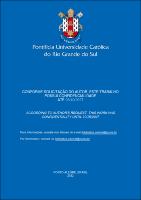| Share record |


|
Please use this identifier to cite or link to this item:
https://tede2.pucrs.br/tede2/handle/tede/10531| Document type: | Dissertação |
| Title: | A trabalhabilidade como direito social fundamental : o critério da ponderação como alternativa à sua realização |
| Author: | Alves, Andressa Munaro  |
| Advisor: | Fincato, Denise Pires |
| Abstract (native): | Permear o que envolve a realização de um trabalho exige energia e atenção ao longo de qualquer análise, sobretudo quando se busca partir de premissas naturalmente humanas, isto é, colocando o ser humano trabalhador como o ponto nevrálgico do estudo, e desse executar. Nessa linha, a pesquisa se desafia a responder dois grandes desafios, o primeiro, é se no cenário pós-moderno o fenômeno da trabalhabilidade é um direito social fundamental a ser assegurado a qualquer trabalhador. E o segundo, se na ausência legislativa, a ponderação pode ser um critério de solução ao julgador na proteção deste direito quando diante de um contexto de novas tecnologias. Para bem responder aos questionamentos propostos, a pesquisa será desenvolvida em dois capítulos subdivididos em três seções cada. Através do método de abordagem sistêmico, visa-se analisar o ordenamento constitucional brasileiro de modo a verificar a possibilidade da recepção de novel direito a seu diploma. Arrimado pelos procedimentos histórico e estruturalista, o desenvolvimento social e legislativo será cotejado para fins de análise acerca de sua harmonia textual para futura recepção jusconstitucional, frente ao fenômeno social da trabalhabilidade, vez que, alinhado ao método interpretativo sistêmico, torna-se possível compreender as diretrizes do sistema e observar a sua concordância. Desenvolvida de forma qualitativa, a pesquisa se valerá predominantemente de bibliografia existente. Por meio de todo o estudo realizado, constata-se que, em um contexto de pós-modernidade, a trabalhabilidade é um direito social fundamental capaz (e à altura) de ser recepcionado pelo ordenamento constitucional brasileiro, manifestamente lastreado pela própria estrutura que lhe sustenta, primando pelo cidadão envolvido, não afastando novos direitos e atenta às mudanças sociais. Descobre-se, também, que o critério da ponderação é uma alternativa viável a sua realização diante de casos concretos, tanto como um caminho para a proteção do novel direito social apurado, como o próprio instrumento catalisador deste constante fomento à labuta efetivamente humana, essa que, como se apurou, proporciona maiores (e melhores) patamares de vida aos seus laboradores. |
| Abstract (english): | Permeating what involves the performance of a work requires energy and attention throughout any analysis, especially when one seeks to start from naturally human premises, that is, placing the working human being as the neuralgic point of the study, and of this execution. In this line, the research challenges itself to answer two major challenges, the first is whether in the postmodern scenario the phenomenon of workability is a fundamental social right to be guaranteed to any worker. And second, if in the absence of legislation, weighting can be a solution criterion for the judge in protecting this right when faced with a context of new technologies. To respond well to the proposed questions, the research will be developed in two chapters subdivided into three sections each. Through the systemic approach method, the aim is to analyze the Brazilian constitutional order to verify the possibility of receiving a new right to its diploma. Supported by historical and structuralist procedures, the social and legislative development will be collated for the purposes of analysis of its textual harmony for future judicial reception, in the face of the social phenomenon of workability, since, in line with the systemic interpretive method, it becomes possible to understand the system guidelines and observe their compliance. Developed qualitatively, the research will predominantly use existing bibliography. Through all the studies carried out, it appears that, in the context of post-modernity, workability is a fundamental social right capable (and at the level) of being accepted by the Brazilian constitutional order, manifestly backed by the very structure that sustains it, prioritizing the citizen involved, not pushing away new rights, and being attentive to social changes. It is also discovered that the criterion of weighting is a viable alternative to its realization in the face of concrete cases, both as a way to protect the newly established social right, and as the very instrument that catalyzes this constant promotion of effectively human toil, this which, as it turned out, provides higher (and better) standards of living for its workers. |
| Keywords: | Trabalhabilidade Direito Fundamental Critério da Ponderação Workability Fundamental Right Weighting Criteria |
| CNPQ Knowledge Areas: | CIENCIAS SOCIAIS APLICADAS::DIREITO |
| Language: | por |
| Country: | Brasil |
| Publisher: | Pontifícia Universidade Católica do Rio Grande do Sul |
| Institution Acronym: | PUCRS |
| Department: | Escola de Direito |
| Program: | Programa de Pós-Graduação em Direito |
| Access type: | Acesso Aberto |
| Fulltext access restriction: | Trabalho será publicado como artigo ou livro |
| Time to release fulltext: | 60 meses |
| Date to release fulltext: | 26/10/2027 |
| URI: | https://tede2.pucrs.br/tede2/handle/tede/10531 |
| Issue Date: | 5-Oct-2022 |
| Appears in Collections: | Programa de Pós-Graduação em Direito |
Files in This Item:
| File | Description | Size | Format | |
|---|---|---|---|---|
| DIS_ANDRESSA_MUNARO_ALVES_CONFIDENCIAL.pdf | ANDRESSA_MUNARO_ALVES_DIS | 384.26 kB | Adobe PDF |  Download/Open Preview |
Items in DSpace are protected by copyright, with all rights reserved, unless otherwise indicated.




